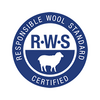
Responsible Wool Standard
Standard Owners (1)
| Name | Country | |
|---|---|---|
| TEXTILE EXCHANGE | 🇺🇸 United States |
About (Responsible Wool Standard)
The Responsible Wool Standard (RWS) is a global standard that addresses the welfare of sheep and the land they graze on in the production of wool. It aims to ensure that wool comes from farms that prioritize the welfare of sheep, promote sustainable land management practices, and respect the rights of farm workers.
The RWS sets out requirements for farms and supply chain entities involved in the production and processing of wool. It covers various aspects of sheep welfare, including the Five Freedoms, which include freedom from hunger and thirst, freedom from discomfort, freedom from pain, injury, or disease, freedom to express normal behavior, and freedom from fear and distress. The standard also promotes best practices in land management, biodiversity conservation, and the responsible use of chemicals.
The RWS certification process involves independent third-party audits to verify compliance with the standard's requirements. Farms and supply chain entities must demonstrate their adherence to the RWS by providing evidence of responsible practices, such as animal health records, pasture management plans, and worker welfare policies. Certified products can then carry the RWS logo, indicating their compliance with the standard.
The RWS is important for several reasons. Firstly, it ensures that sheep are treated with care and respect, promoting their well-being and minimizing the risk of unnecessary harm or stress. Secondly, it encourages sustainable land management practices, which can help protect ecosystems, prevent soil erosion, and conserve water resources. Thirdly, it supports transparency and traceability in the wool supply chain, allowing consumers to make informed choices about the products they purchase.
By adopting the RWS, brands and retailers demonstrate their commitment to responsible sourcing and sustainability. It provides assurance to consumers that the wool used in their products comes from farms that meet rigorous animal welfare and environmental standards. Additionally, the RWS helps to drive improvements within the industry by promoting best practices and encouraging continuous improvement.
Overall, the Responsible Wool Standard plays a crucial role in ensuring the ethical and sustainable production of wool, protecting the welfare of sheep, and promoting responsible land management practices.